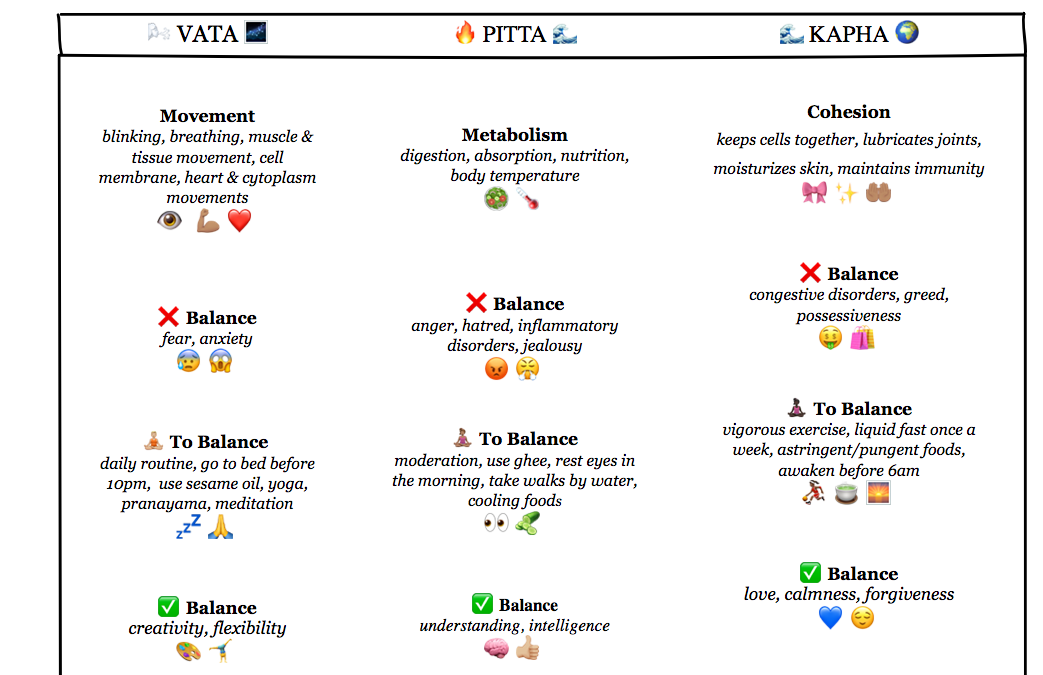What are the doshas?
Ayurveda states that the entire cosmos is an interdependent relationship between the five elements – Air, Earth, Water, Ether and Fire. The doshas (Vata, Pitta, Kapha) bind the five elements to the body in order to sustain life. The English language does not provide the complexity and nuances of the doshas, so the original Sanskrit words of Vata, Pitta and Kapha are used.
What is the difference between your constitution and the doshas?
In it’s direct translation from Sanskrit to English, “dosha” means “impurity” or “fault”, but this is only true when your doshas are out of balance. Each of us has all three doshas present within us, all arranged in an individualistic way at birth – this is your constitution, also known as your Prakriti. There are different ratios of the doshas within everyone at birth, which is why Ayurveda is not a “one size fits all” practice. As we grow older, the world shapes and molds us, which can change our dosha balance. This is the state of Vikruti, which is the measure of whether or not your constitution is balanced. The goal of Ayurveda is to get back to Prakriti, to your original constitution at birth. Ayurveda provides the outlines of balancing our constitution through diet, exercise, breathing techniques, spiritual work and more.
How does a dosha become imbalanced?
If your doshas are out of balance, it will pollute and disrupt the function of your dhatus (tissues). Imbalance occurs when there is an excess of a dosha present, and it is possible for one or all doshas to be imbalanced at one time. Your state of balance is subject to change over time with the seasons, climates and stages of life (Rasa Ayurveda).
How do I know if my doshas are imbalanced?
The presence of disease, malaise and malcontentedness in your life are signifiers that your doshas are out of balance. Take inventory of your life, and be honest with yourself in the ways that you feel discomfort daily. This could be the consistent headache you have when you wake up, not feeling heard or being genuine in your relationships, eating poorly, sticking with mindsets that don’t serve you etc… Refer to our Mental Digestion Process article to explore more on how mental indigestion affects the doshas.
How can I balance my overall constitution?
To balance mind, body and consciousness, we have to understand how the five elements and three doshas interact. Ether is essentially inert (all around us), and Earth is a solid (the foundation for creation), so these two elements are not dominant in any of the three doshas. They also do not directly govern actions in the body, like fire (metabolism), water (cohesion) and air (movement) do. The body is a system of interdependent systems.
Vata = Air & Ether ?️?
Pitta = Fire & Water ??
Kapha = Water & Earth ??
There is a simple rule in Ayurveda of “like increases like”, meaning that opposites balance. For example, if your Pitta is in excess, you would feel more easily agitated, judgmental and may be experiencing acidity in your digestive tract. To balance this, you would engage in nutrition, exercise and spiritual work that is cooling, stable and slow. This is a good rule to remember in your daily balance!
Be sure to take our quiz online, and/or schedule a consultation with us at www.santacruzayurveda.com !
Vocabulary:
Dosha – organization of 5 elements (Vata, Pitta, Kapha)
Dhatus – bodily tissues
Prakriti – constitution at birth
Vikruti – constitution after birth
Resources:
QA to QI
Rasa Ayurveda
Textbook of Ayurveda: Fundamental Principles by Dr. Vasant Lad
Diagram created by Santa Cruz Ayurveda
